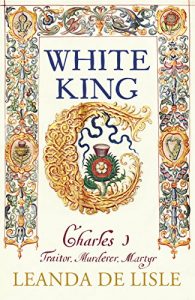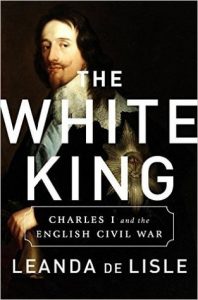 I don't really do book reviews anymore, I leave them to Tudor Society book reviewer Charlie Fenton, but when one of your favourite historians asks you if you'd like a review copy of their next book then you just don't say no, do you?! Saying no would be rather silly.
I don't really do book reviews anymore, I leave them to Tudor Society book reviewer Charlie Fenton, but when one of your favourite historians asks you if you'd like a review copy of their next book then you just don't say no, do you?! Saying no would be rather silly.
Let me start by saying that I haven't studied Charles I and the English Civil War since History A' Level and that's quite a long time ago now [cough, cough, splutter, splutter]. I hadn't read a book on his reign since then, so my ideas about Charles I were rather dated, to say the least. I knew that the traditional view of Charles as weak and stupid was probably an unfair one so I was looking forward to reading Leanda de Lisle's take on this man, particularly as her book on the Grey sisters, The Sisters Who Would Be Queen, is one of my all-time favourite history books. If anyone was going to challenge the myths, peel back the layers of propaganda and bad history, and reveal the real man then I was sure it was going to be Leanda.
I read a lot of history books [understatement], as you know. I spend all day every day surrounded by them, it's what I do, and I'm also a voracious reader. Some history books are meticulously researched and can be relied on for accuracy, but I wouldn't choose to read them for pleasure. Others are highly readable but cannot be trusted because they regurgitate the old myths and rely on suspect sources. But then there are those wondrous tomes, those perfect history books, the ones that follow that perfect recipe: meticulous research, historical accuracy and a style that is so readable that you get swept away like you're reading a novel.
Which one is The White King?
Well, I'm pleased to say it's the latter.
I could end the review here and just say "buy it", as that is my advice and what this review boils down to, but I'll tell you a bit more about the book...
 The White King is a detailed biography of King Charles I. It takes the reader from Charles I's youth all the way through to his execution and legacy. On the way, we are introduced to key characters in Charles' life: his father's favourite and lover, George Villiers, Duke of Buckingham; Charles's beloved wife, Henrietta Maria; royal favourites like Lucy Hay, Countess of Carlisle, and Henry Holland; Jane Whorwood, the Royalist spy; Charles's children; Oliver Cromwell... These characters are thoroughly analysed and brought to life. I came away feeling that I had got to know the real Charles I. I felt that Leanda's treatment of the king was fair. He wasn't a stupid man, but there were times when he was stupid; he wasn't a tyrant or monster, and he wasn't just a victim or martyr either, he was so much more than that. This Charles I was complex, as we all are. In her author's note, Leanda writes "This portrait, informed by new manuscripts, depicts a king of high ideals, who inspired great loyalty: but who was also a man of flesh and blood" and that is definitely the Charles I saw in her book. I was drawn into his life and story, how much so is evidenced by just how moved I was by his downfall and tragic end. Sometimes I wanted to shake the man, other times I respected and admired him; sometimes I disliked him immensely, other times I felt real affection for him, he was so real in this book.
The White King is a detailed biography of King Charles I. It takes the reader from Charles I's youth all the way through to his execution and legacy. On the way, we are introduced to key characters in Charles' life: his father's favourite and lover, George Villiers, Duke of Buckingham; Charles's beloved wife, Henrietta Maria; royal favourites like Lucy Hay, Countess of Carlisle, and Henry Holland; Jane Whorwood, the Royalist spy; Charles's children; Oliver Cromwell... These characters are thoroughly analysed and brought to life. I came away feeling that I had got to know the real Charles I. I felt that Leanda's treatment of the king was fair. He wasn't a stupid man, but there were times when he was stupid; he wasn't a tyrant or monster, and he wasn't just a victim or martyr either, he was so much more than that. This Charles I was complex, as we all are. In her author's note, Leanda writes "This portrait, informed by new manuscripts, depicts a king of high ideals, who inspired great loyalty: but who was also a man of flesh and blood" and that is definitely the Charles I saw in her book. I was drawn into his life and story, how much so is evidenced by just how moved I was by his downfall and tragic end. Sometimes I wanted to shake the man, other times I respected and admired him; sometimes I disliked him immensely, other times I felt real affection for him, he was so real in this book.
What I'm trying to get across is that this is a must-read! Not only is it a wonderful read, but it also has beautiful illustrations (lots of portraits), an appendix on Lucy Carlisle, family trees and a map, AND, the most important thing for me, detailed notes and bibliography. In my British hardback edition, the notes section stretches from page 299 to 376 (bliss!) and there are also useful footnotes throughout. The bibliography and notes show just how much work went into this book, so much original research, and the result shows that this project was a true labour of love.
Buy it.
Blurb
Less than forty years after the golden age of Elizabeth I, England was at war with itself. The bloody, devastating civil wars set family against family, friend against friend. At the head of this disintegrating kingdom was Charles I. His rule would change the face of the monarchy for ever.
Charles I’s reign is one of the most dramatic in history, yet Charles the man remains elusive. Too often he is recalled as weak and stupid, his wife, Henrietta Maria, as spoilt and silly: the cause of his ruin. In this portrait -- informed by newly disclosed manuscripts, including letters between the king and his queen -- Leanda de Lisle uncovers a Charles I who was principled and brave, but also fatally blinkered. He is revealed as a complex man who pays the price for bringing radical change; Henrietta Maria as a warrior queen and political player as impressive as any Tudor. Here too are the cousins who befriended and betrayed them: the peac*cking Henry Holland, whose brother engineered the king’s fall; and the magnetic ‘last Boleyn girl’, Lucy Carlisle.
This is a tragic story for our times, of populist politicians and religious war, of a new media and the reshaping of nations, in which women vied with men for power. For Charles it ended on the scaffold. Condemned as a traitor and murderer, he was also heralded as a martyr: his reign destined to sow the seeds of democracy across Britain and the New World.
Amazon links for kindle and hardback editions:



Looking forward to reading this book on Charles I by Leanda de Lisle –
It is brilliant, I can’t recommend it highly enough.
I recently purchased this book on Charles I as I heard it had new material based on personal and intimate letters. I have read several on Charles so am looking to see how this compares and I couldn’t resist such a beautiful cover.
It’s on my list! Thanks for the great review Claire.